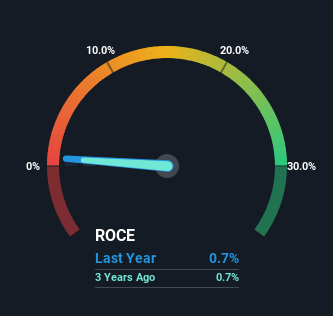Returns On Capital Signal Difficult Times Ahead For Taiwan Fertilizer (TWSE:1722)
When we're researching a company, it's sometimes hard to find the warning signs, but there are some financial metrics that can help spot trouble early. Typically, we'll see the trend of both return on capital employed (ROCE) declining and this usually coincides with a decreasing amount of capital employed. Basically the company is earning less on its investments and it is also reducing its total assets. So after we looked into Taiwan Fertilizer (TWSE:1722), the trends above didn't look too great.
Return On Capital Employed (ROCE): What Is It?
Just to clarify if you're unsure, ROCE is a metric for evaluating how much pre-tax income (in percentage terms) a company earns on the capital invested in its business. Analysts use this formula to calculate it for Taiwan Fertilizer:
Return on Capital Employed = Earnings Before Interest and Tax (EBIT) ÷ (Total Assets - Current Liabilities)
0.0069 = NT$550m ÷ (NT$81b - NT$1.8b) (Based on the trailing twelve months to December 2024).
So, Taiwan Fertilizer has an ROCE of 0.7%. In absolute terms, that's a low return and it also under-performs the Chemicals industry average of 6.0%.
View our latest analysis for Taiwan Fertilizer

Historical performance is a great place to start when researching a stock so above you can see the gauge for Taiwan Fertilizer's ROCE against it's prior returns. If you'd like to look at how Taiwan Fertilizer has performed in the past in other metrics, you can view this free graph of Taiwan Fertilizer's past earnings, revenue and cash flow.
How Are Returns Trending?
We are a bit worried about the trend of returns on capital at Taiwan Fertilizer. About five years ago, returns on capital were 2.2%, however they're now substantially lower than that as we saw above. On top of that, it's worth noting that the amount of capital employed within the business has remained relatively steady. Companies that exhibit these attributes tend to not be shrinking, but they can be mature and facing pressure on their margins from competition. If these trends continue, we wouldn't expect Taiwan Fertilizer to turn into a multi-bagger.
In Conclusion...
In summary, it's unfortunate that Taiwan Fertilizer is generating lower returns from the same amount of capital. But investors must be expecting an improvement of sorts because over the last five yearsthe stock has delivered a respectable 49% return. Regardless, we don't feel too comfortable with the fundamentals so we'd be steering clear of this stock for now.
On a separate note, we've found 2 warning signs for Taiwan Fertilizer you'll probably want to know about.
While Taiwan Fertilizer isn't earning the highest return, check out this free list of companies that are earning high returns on equity with solid balance sheets.
Valuation is complex, but we're here to simplify it.
Discover if Taiwan Fertilizer might be undervalued or overvalued with our detailed analysis, featuring fair value estimates, potential risks, dividends, insider trades, and its financial condition.
Access Free AnalysisHave feedback on this article? Concerned about the content? Get in touch with us directly. Alternatively, email editorial-team (at) simplywallst.com.
This article by Simply Wall St is general in nature. We provide commentary based on historical data and analyst forecasts only using an unbiased methodology and our articles are not intended to be financial advice. It does not constitute a recommendation to buy or sell any stock, and does not take account of your objectives, or your financial situation. We aim to bring you long-term focused analysis driven by fundamental data. Note that our analysis may not factor in the latest price-sensitive company announcements or qualitative material. Simply Wall St has no position in any stocks mentioned.
About TWSE:1722
Taiwan Fertilizer
Manufactures and sells inorganic and organic fertilizers, and other chemical products in Taiwan and internationally.
Adequate balance sheet with very low risk.
Similar Companies
Market Insights
Community Narratives



